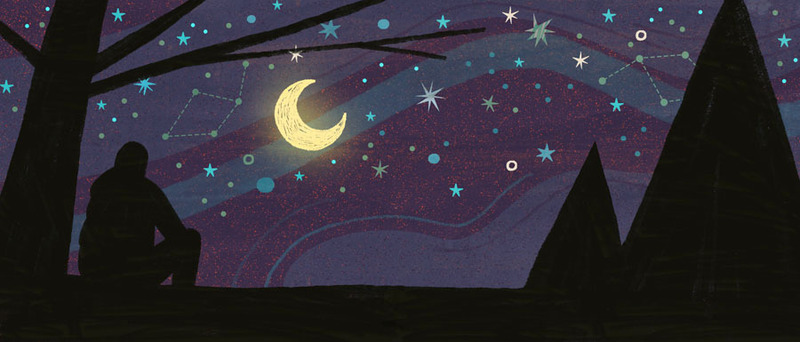 Illustration by Dante Terzigni
Illustration by Dante Terzigni
Every few months my mother sends my brothers and me a text with two words: “the moon.” I was talking to my brother Austin some years ago when he received one of these texts. “Mom just texted me ‘the moon,’” he said.
“What does that mean?” I told him I thought Mom was suggesting we go outside and look at the moon.
My mother alerts us to upcoming supermoons, strawberry moons, blood moons, blue moons. For a family celebration a few years ago, she chose the theme: a “June Moon” party. I don’t know what prompted it, but for several years Mom’s lunar interest has been waxing.
In 2017, my parents drove from Virginia to South Carolina to enter the path of totality of a solar eclipse. I like the idea of a crowd converging for an astronomical event rather than a sporting event: everyone wins or loses to the same degree. As the crowd gathered, so did the clouds. Skygazers packed their telescopes back into their cars hoping to find a clearer vantage; my parents followed. A few miles down the road, onlookers experienced an incomplete eclipse — a darkening without complete darkness — and the birds didn’t erupt in frenzy as had been foretold.
During a recent evening stroll, my parents paused at the end of their cul-de-sac. When a neighbor asked what they were doing, my mother said that they were looking at the moon. As she recounts the scene, she raises her eyebrows and reveals the outline of her irises, mimicking how Mr. Jones must have appeared while looking at her and my father, as though they were adjusting a rooftop antenna to capture the cosmic noise frequency.
My mother’s “moon” texts aren’t specific to a certain season of the year; they appear in winter as readily as in summer. I don’t talk to her daily, so such a text may be our first or only interaction of the day. “The moon” appears as a non sequitur. It’s like a blurted response in Pictionary. A guesser watches the drawer’s pencil move in a circle and shouts: “Pizza!” Although Mom’s lunar texts contain no exclamation points, I infer enthusiasm from the sender.
I keep my phone on silent mode, so it’s likely I won’t notice the text immediately. If I receive it while I’m at home, I’ll consider descending my apartment staircase and stepping onto the front stoop to look up at the sky. I think this delayed response is appropriate for a 30-plus-year-old adult child; I’m not responding to a parent’s directive, like “Please set the table for dinner.” Rather, I’m receiving an alert that I can decide to act upon or not, at a time of my choosing.
Mom wouldn’t want to interrupt my activity anyhow. Her “moon” text doesn’t require a reply. I might receive it while I’m at a meeting, out with friends or already in bed. In these cases, I’ll forgo the viewing. The prompt is unobtrusive, like the moon itself.
Flipping through my mother’s recipe book one day, I found a page devoid of ingredients and measurements that instead offered a quote attributed to St. Ignatius: “Encourage the children of this world to show greater care and solicitude for the things of eternity than for those of time.” The quote wasn’t posted in cute script on her kitchen wall. Instead Mom had placed it in a sheet protector just as she had other recipes in the book. It struck me as an amendment one might scrawl on a recipe — “Substitute white with whole-wheat flour” — or a strikethrough of “heavy whipping cream” with the notation, “use half-and-half.”
Could I tell when white flour is replaced with whole wheat? I wonder if the meals I recognize always involve these substitutions, or only sometimes. And how often is my mother inserting Ignatius’ directive — this guidance toward the things of eternity — into the mix of the everyday?
I suspect her “the moon” texts are a hint. The moon is not eternal, but its glow outlasts whatever flickers before me at the moment. The invitation to look upward is like a pinch of garnish on a favorite dish — something unnecessary but recommended. Or like the pinch of my mother’s hands on the cover of a pot simmering on the stovetop, Mom’s two texted words like two fingers that extend toward her children, who no longer live under her roof. We are the ingredients, busily interacting with the elements around us, when she lightly lifts the lid.
Erin Buckley lives in Richmond, Virginia, where she works as an occupational therapist.